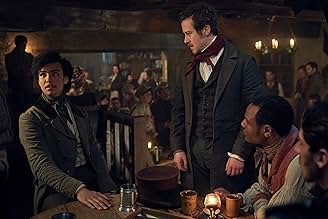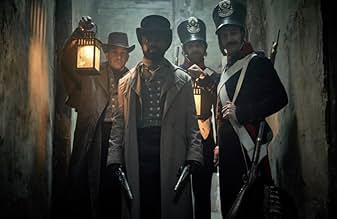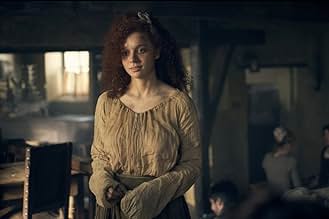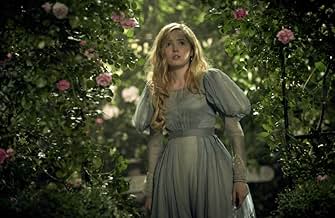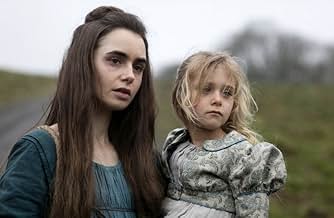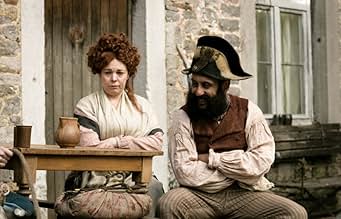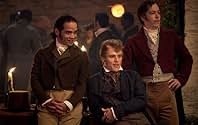Jean Valjean sfugge alla cattura da parte dell'inflessibile ispettore Javert con lo sfondo della Francia nell'epoca successiva a Napoleone, mentre i disordini iniziano di nuovo ad attanaglia... Leggi tuttoJean Valjean sfugge alla cattura da parte dell'inflessibile ispettore Javert con lo sfondo della Francia nell'epoca successiva a Napoleone, mentre i disordini iniziano di nuovo ad attanagliare la città di Parigi.Jean Valjean sfugge alla cattura da parte dell'inflessibile ispettore Javert con lo sfondo della Francia nell'epoca successiva a Napoleone, mentre i disordini iniziano di nuovo ad attanagliare la città di Parigi.
- Premi
- 4 candidature totali
Sfoglia gli episodi
Recensioni in evidenza
Episode 1 complete, and I will definitely keep watching. Having previously been put off the story by the musical versions I was happy to see a drama available which I hope will give me a sense of the original story with which I am unfamiliar. So far the cast seems excellent and the whole thing has a big budget feel. The story is just unfolding and I hope they can keep up the quality.
I just finished the first episode and the excitement I feel is like no other. For the first time, I feel like the novel of Les Misérables has finally caught the eyes of some brilliant director who can bring out the full potentials of the story to light . Now right from the beginning when you watch, you can sense that there is something special about this show. The cinematography, the acting, and the outstanding story are all mixed together to exhibit a work that I might personally claim to be far better than the previous versions of Liam Neeson and Hugh Jackman.
An excellent adaption of a masterpiece is almost ruined at the BBC's attempt to take political correctness to dizzying heights. There were most probably very few if any black people in France at this time - let alone a black policeman (a sergeant at that).
If you can filter this (major) distraction out of the film, this is not a bar adaption at all. Mesmerising in its delivery and very entertaining.
If you can filter this (major) distraction out of the film, this is not a bar adaption at all. Mesmerising in its delivery and very entertaining.
This isn't an adaptation of Victor Hugo's book, it's a remake of the 2012 film, which makes it an adaptation of adaptation of an adaptation. The only things it has to differentiate it is is added violence against women (realism!), a depressingly pessimistic ending (which goes against Hugo's message), sexualisation of child prostitute Éponine (fairly certain this writer has a virgin-whore complex and learnt nothing from Fantine's story), racist casting (cringe-worthy in the case of Thénardier who becomes a slave trader), no empathy for the dispossessed (Fantine is apparently stupid for seeing becoming a prostitute as a last resort) and poor depiction of LGBT people as deviant (they are in the background of a completely unnecessary and added brothel scene, but otherwise absent). Oh, and horrible characterisation, to almost parodic levels. In fact if this series called itself "The BDSM Love Story of Inspector Javert and Jean Valjean" I'd be a lot less harsh, it does sort of work as a very boring parody.
Bizarrely, amongst this relentless "realism" Cosette sticks out like a sore thumb. She's styled like a golden-locked fairy princess, however simultaneously her love story is ruined. Rather than realising that one day love affairs only work in musical theatre and taking the opportunity to flesh out this part of the story with scenes from the novel, instead a large age difference and a couple of off-putting scenes (suggested by nothing in any other version of the story that I've come across) have been introduced making it clear this Marius does not have eyes only for Cosette. Why? Because degrading everything is what makes good TV? Writer didn't like Marius and/or Cosette? They got mixed up and accidently read a fanfiction and used that as source material? No idea, but considering the autobiographical details he added to this part of the novel Hugo is spinning in his grave. To complete the insult I'm surprised there was no implication that the couple would go on to be unfaithful and embittered with eachother, just to really hammer home that all of Fantine's sacrifices were for naught and Jean Valjean would have been better off leaving her with the Thénardiers (their children seem a lot happier with their lot in life). It would've also thoroughly stripped both lovers of their innocence rather than just the one, instead I'm left pondering why Cosette gets the opposite treatment compared to every other role.
On the topic of Hugo, I suppose this writer never considered that he didn't give his characters full names for a reason, and has decided to amend that grave error. Remember that iconic character Fantine Thibault? No? Characters with no other purpose than to be expositioned at are also invented whole cloth, it's all truly amateur. And trashy. Hugo was a Romantic poet who also wrote beautiful prose, but here we're treated instead to peeing scenes (insert pun about taking the piss here). Even when I pretended this was an original story with original characters I found all of the male characters creepy, the female characters pathetic/underdeveloped, I didn't believe in any of their relationships and I detested the pessimistic, humourless storytelling.
I can't even praise the less important parts of the production. Words were mispronounced in a way that even I could pick up on. Cosette's distractingly modern side parting annoyed the hell out of me. There are some really uncharismatic performances. It's a visual replica of the 2012 film to the point of intellectual property theft. I suppose Walder Frey was good as the grandpa, the kid actors were cute, and the outdoor scenes looked pretty. That's all I've got.
Overall for a Les Misérables adaption it's strangely un-socially conscientious, choosing to degrade the great novel rather than update it. It's a shame that this wasn't better handled, and it's a shame that many will now think this mean-spirited distortion is an accurate representation. Teachers, please don't use this for teaching except as an example of how to more or less stick to the plot but rip out the soul of the work you're adapting. Don't be fooled by the BBC's prestige, if you want a songless version the 1934 French films are much better and actually respect the source material. This one strangely enough is a reflection of the BBC as an institution - at first glance polished, but with a seedy underbelly.
(PS - Anyone heavily involved in the decision-making of this production should go on to make a version of Love in the Times of Cholera, if they haven't already.)
Bizarrely, amongst this relentless "realism" Cosette sticks out like a sore thumb. She's styled like a golden-locked fairy princess, however simultaneously her love story is ruined. Rather than realising that one day love affairs only work in musical theatre and taking the opportunity to flesh out this part of the story with scenes from the novel, instead a large age difference and a couple of off-putting scenes (suggested by nothing in any other version of the story that I've come across) have been introduced making it clear this Marius does not have eyes only for Cosette. Why? Because degrading everything is what makes good TV? Writer didn't like Marius and/or Cosette? They got mixed up and accidently read a fanfiction and used that as source material? No idea, but considering the autobiographical details he added to this part of the novel Hugo is spinning in his grave. To complete the insult I'm surprised there was no implication that the couple would go on to be unfaithful and embittered with eachother, just to really hammer home that all of Fantine's sacrifices were for naught and Jean Valjean would have been better off leaving her with the Thénardiers (their children seem a lot happier with their lot in life). It would've also thoroughly stripped both lovers of their innocence rather than just the one, instead I'm left pondering why Cosette gets the opposite treatment compared to every other role.
On the topic of Hugo, I suppose this writer never considered that he didn't give his characters full names for a reason, and has decided to amend that grave error. Remember that iconic character Fantine Thibault? No? Characters with no other purpose than to be expositioned at are also invented whole cloth, it's all truly amateur. And trashy. Hugo was a Romantic poet who also wrote beautiful prose, but here we're treated instead to peeing scenes (insert pun about taking the piss here). Even when I pretended this was an original story with original characters I found all of the male characters creepy, the female characters pathetic/underdeveloped, I didn't believe in any of their relationships and I detested the pessimistic, humourless storytelling.
I can't even praise the less important parts of the production. Words were mispronounced in a way that even I could pick up on. Cosette's distractingly modern side parting annoyed the hell out of me. There are some really uncharismatic performances. It's a visual replica of the 2012 film to the point of intellectual property theft. I suppose Walder Frey was good as the grandpa, the kid actors were cute, and the outdoor scenes looked pretty. That's all I've got.
Overall for a Les Misérables adaption it's strangely un-socially conscientious, choosing to degrade the great novel rather than update it. It's a shame that this wasn't better handled, and it's a shame that many will now think this mean-spirited distortion is an accurate representation. Teachers, please don't use this for teaching except as an example of how to more or less stick to the plot but rip out the soul of the work you're adapting. Don't be fooled by the BBC's prestige, if you want a songless version the 1934 French films are much better and actually respect the source material. This one strangely enough is a reflection of the BBC as an institution - at first glance polished, but with a seedy underbelly.
(PS - Anyone heavily involved in the decision-making of this production should go on to make a version of Love in the Times of Cholera, if they haven't already.)
Reading the promotional interviews make it clear the writer was very unsuited for this project and has poor literary comprehension. On the continuing relevance of Les Misérables: "People are asking themselves 'how is it possible to live a good life in a world like this?'. You know, 'can we marry the ones we love, or are we going to have to settle for second best?'" Another charming quote: "I toyed with the idea of Javert having loveless sex with a 50-year old prostitute to 'clean the pipes out.'"
He seems very preoccupied with the musical and doesn't appear to realise Les Misérables is one of the most adapted works of all time, with many non-musical versions.
He gave Marius a "wet dream" not about Cosette but his neighbour the Jondrette girl, a teenage girl forced into prostitution by her father. Heartthrob material? Actor John O'Connor seems to be thinking of the dreaded musical when he says that Marius loves her as a sister.
Amusingly the more Hugo describes you as quiet and introverted, the more likely you are to begin roaring in Les Misérables (2018).
Critics have a history of getting it wrong with Les Misérables and that trend continues here. 1/10 for competent directing and some lovely shots.
He seems very preoccupied with the musical and doesn't appear to realise Les Misérables is one of the most adapted works of all time, with many non-musical versions.
He gave Marius a "wet dream" not about Cosette but his neighbour the Jondrette girl, a teenage girl forced into prostitution by her father. Heartthrob material? Actor John O'Connor seems to be thinking of the dreaded musical when he says that Marius loves her as a sister.
Amusingly the more Hugo describes you as quiet and introverted, the more likely you are to begin roaring in Les Misérables (2018).
Critics have a history of getting it wrong with Les Misérables and that trend continues here. 1/10 for competent directing and some lovely shots.
Lo sapevi?
- QuizLily Collins previously auditioned for the role of Eponine in the movie musical adaption Les Misérables (2012), losing out to Samantha Barks. In this adaption, Collins plays Fantine.
- ConnessioniFeatured in Jeremy Vine: Episodio #2.9 (2019)
I più visti
Accedi per valutare e creare un elenco di titoli salvati per ottenere consigli personalizzati
- How many seasons does Les Misérables have?Powered by Alexa
Dettagli
- Data di uscita
- Paesi di origine
- Siti ufficiali
- Lingue
- Celebre anche come
- Les Misérables
- Luoghi delle riprese
- Sedan, Francia(Medieval Paris; near the Belgian Border)
- Aziende produttrici
- Vedi altri crediti dell’azienda su IMDbPro
Contribuisci a questa pagina
Suggerisci una modifica o aggiungi i contenuti mancanti




